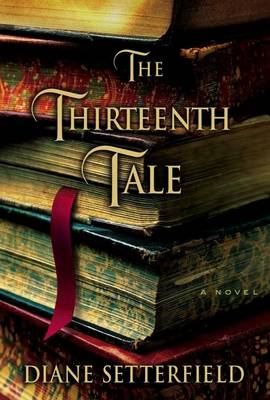Reviewed by Jo on
Trigger/Content Warnings: This book features dementia, self-harm, abandoned children, child neglect, violence against women, rape, incest, violence, murder, and arson.
I bought The Thirteenth Tale by Diane Setterfield on a whim, as it was a book recommended to me on StoryGraph based on my reading history. While it's not the usual kind of book I would read, I absolutely loved it!
I bought The Thirteenth Tale on a whim based on the description of a different edition of the book, that hinted heavily that this was a book that was about books and reading, as much as it was about an author's past, and made it sound like it was magic realism. And while there are books, and a mystery surrounding one of Vida Winter's titled The Thirteen Tales of that only featured twelve stories, the story actually has very little to do with books and reading, and was barely a fantasy at all. So once I'd started reading, I was quite wary, as, not getting the story I originally thought I'd be getting, I didn't think I would like it. But I was pleasantly surprised!
Vida Winter, a famous and prolific author, has hired Margaret Lea to write her biography. Over the years, she has told journalists wild tales about her life, each more outlandish than the last. But now Vida is ill, and doesn't have long left. It's time to tell the truth about her past, about Angelfield and the family that lived there. But she has conditions: stories have a beginning, a middle, and an end, and she will tell her story in order. No questions, no trying to jump forward to look at the last page. She will tell it in her own way. The Thirteenth Tale is that biography, but it's unlikely the biography Vida originally expected. For Margaret has her own story, her own ghosts, and the tale Vida tells, stranger than fiction, has Margaret remembering what she would rather leave buried. But as everyone has a story, so do secondary characters, and as the tale is told, stories overlap and connect in unexpected ways. The Thirteenth Tale is not just Vida's story, but the story of writing it.
I have to say I wasn't a huge fan of Margaret. I just didn't warm to her voice, and wasn't quite as keen when Vida would stop dictating, and we were back with Margaret's thoughts and questions about Vida's story. However, Margaret does her research for the biography, so the things she discovers, the people she meets, the visits to the ruins of the old Angelfield house are all important to Vida's own story. Vida may tell her story her own way, but there are clues as to what happened, all those years ago. But despite the fact I didn't warm to her very much, nor cared a great deal about her story, it doesn't mar my overall love of the story.
Because I absolutely loved Vida's narration. She's not just an author, she's a storyteller, and I fell right under her spell. It was this that kept me reading after I properly realised The Thirteenth Tale wasn't the book I expected. I just loved her voice, and was completely gripped. Her story is strange and weird, and I would often be thinking, "What the hell?!" at how messed up the story was at times. The book is a slow burner, and I did at times wonder where this story was going - yes, it's kind of weird, and the two twins, Adeline and Emmeline, run amok with very little discipline, but what was the point of the story? This sounds like I was annoyed or frustrated, but I was merely curious, because I was absolutely gripped by Vida's voice. But after a while, the mystery made itself more fully known, and I became engrossed in the story itself. Things at Angelfield go from bad to worse, and slowly but surely the questions ramp up. Is Vida actually telling the truth? What did actually happen? And who did what?
When the twist is finally revealed, I was completely knocked for six. I didn't see it coming at all. But as the penny dropped, I realised there were clues throughout. It's the kind of book you want to start reading all over again immediately after finishing, having this hindsight of what was actually going on all the time. When the truth comes out, it's absolutely heartbreaking, and you realise the story of the Angelfield family is more than just weird, it's tragic, in so many ways, on so many levels. You don't expect when reading a mystery to end up close to tears when the truth is revealed. By the time I reached the end, it wasn't the story I thought I was reading.
Considering the neglect and abuse that runs rampant throughout the story, it feels inappropriate to say it's a beautiful story, but it is. Because overall, it's a story about love, a story of survival. But it is more tragic than I can put into words. There's so much I want to say, so much I want to talk about, but I would be giving far too much away. And this is definitely a book you should go into not knowing a huge amount about, so you can fall in love with Vida's storytelling, and then be taken in by the mystery. Just prepare to have your heart completely broken.
Reading updates
- Started reading
- 13 March, 2021: Finished reading
- 13 March, 2021: Reviewed
